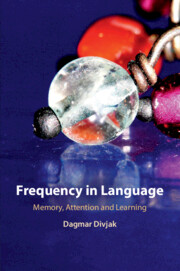6 - The Brain’s Attention-Orienting Mechanisms
from Part III
Published online by Cambridge University Press: 26 September 2019
Summary
In the previous chapters we have discussed how frequency of occurrence is one of the most reliable predictors of human behaviour, including producing and comprehending language. It comes as no surprise then that frequency of occurrence and co-occurrence has played a crucial role in the development of usage-based linguistics, which grounds language knowledge in exposure to usage.
Information
- Type
- Chapter
- Information
- Frequency in LanguageMemory, Attention and Learning, pp. 161 - 181Publisher: Cambridge University PressPrint publication year: 2019
